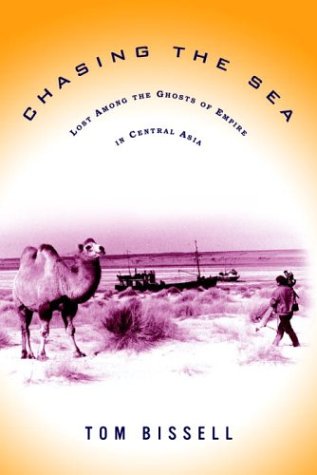
Down and out in Uzbekistan with RPCV Tom Bissell
Down and out in Uzbekistan
CHASING THE SEA: LOST AMONG THE GHOSTS OF EMPIRE IN CENTRAL ASIA
Tom Bissell Pantheon Books, 351 pages, $37.95.
BY PAUL ISAACS
After seven months with the Peace Corps in Uzbekistan, Tom Bissell was a beaten man. He'd had dysentery, he'd shat away 50 pounds of body weight, he'd thought of suicide, he'd had a nervous breakdown. Worst of all, he missed his girlfriend. Assigned to stay in Central Asia for more than two years, Bissell was given his marching orders after a bare quarter of that time.
Five years later, he was back. An assignment from Harper's led him to the Aral Sea, site of one of the world's worst ecological disasters. Chasing the Sea, his document of that return, is part travel journalism, part history and part reckoning. It is, the author writes, an attempt to "find and reassemble a mislaid, broken part of myself."
This is less heavy going than it sounds. A regular contributor to Dave Eggers'The Believer magazine, Bissell is a dedicated follower of the McSweeney's template, his prose wrapped tightly in comfort blankets of self-aware humour and circuitous irony. There is much wild digression: the book could have been marketed as Nick Hornby Goes to Hell. A typical episode will begin with the author being hassled by the Uzbek police, an event that triggers a rant about travel writer Robert D. Kaplan, followed by a dissection of Genghis Khan's destruction of medieval Tashkent, which itself sets off another yarn about the hirsuteness of Russian leaders and a literary analysis of Joseph Conrad's Nostromo. Twenty pages later, Bissell returns to his story. This happens a lot.
His second trip to Uzbekistan is even darker than the first: "The whole nation," Bissell writes, "lay trapped beneath a bucketing gray ceiling of what seemed a single massive cloud." Most of the NGO workers he speaks to lament the country's fall off the mass-media map -- "Where-the-hell-istan" as one Médecins Sans Frontières doctor puts it.
Uzbekistan did briefly come to mainstream news prominence after 9/11, when its dictator/president, Islam Karimov, allowed the US air force to use Uzbek bases while bombing Afghanistan. More recently, Karimov became one of George W. Bush's "coalition of the willing," in the process earning his government a pass for its rampant human rights abuses, especially against the large, native Muslim population.
Bissell only tangentially mentions this conflict, which is fine: there's plenty of misery to spare elsewhere. After a few hundred pages of comic/ tragic adventures, he finally arrives at Moynaq, once the Aral seaside destination of choice for Stalin's bureaucrats, now a parched wasteland of tuberculosis, over 70 miles from the beach's dehydrated shore.
Thanks to the Communist Party's suicidal cottonfield irrigation system, the Aral Sea -- once larger than Lake Huron -- has shrunk by over 50 per cent in as many years. In the most memorable section of the book (the part already excerpted in Harper's), Bissell finally sheds his po-mo veneer, awed by the Aral's apocalyptic desolation. With its marine life long-dead, Aral fisherman have simply left their boats to beach on the shore, the wind blowing them empty across the water. On a nearby inlet lies a dormant, heavily guarded anthrax factory; marksmen wait outside, shooting cows that venture too close. This is painful stuff, but brilliantly captured.
Be warned, though: those looking for a straightforward analysis of the region should probably browse elsewhere. If anything, Chasing the Sea is too well researched: large swaths of pages are dedicated to Genghis Khan, Russian agriculture and long-forgotten mullahs. No fact is turned down and over 350 pages, the mind wanders. It's a testament, though, to Bissell's writing skill that such flab never overwhelms his central narrative. He has not quite produced a classic here, but someday he will.
